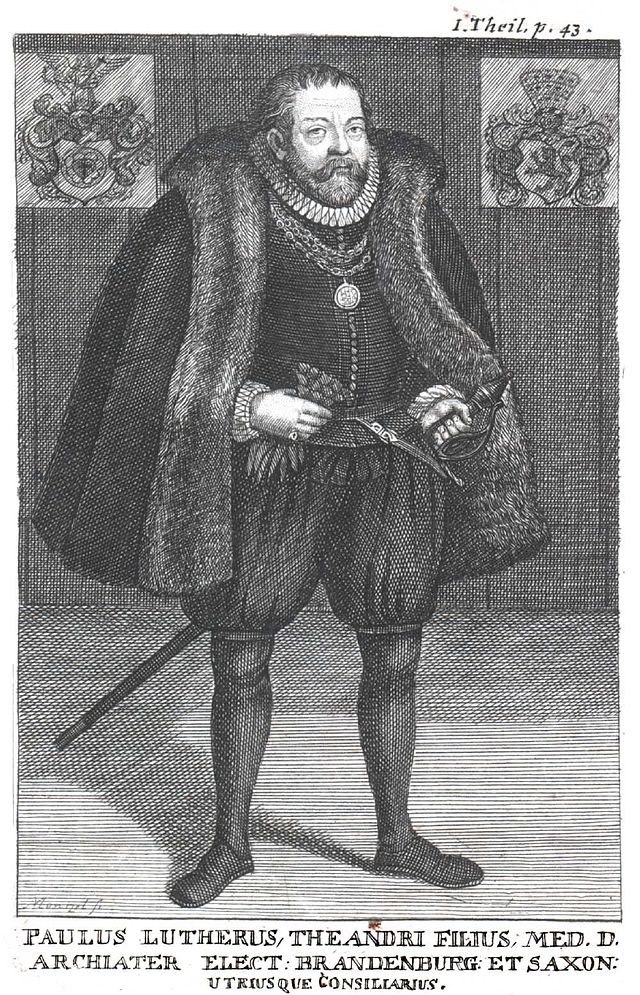I struggled with the 52 Ancestors theme of “King” this week. At first I thought that it was going to be impossible, although I hated to think that I would have to abandon the idea of using the theme so early in this year’s challenge. After some effort, I actually came up with two ancestors (a father and son) who had dealings with royalty. My 11x great-grandfather, Martin Luther, was denounced for his religious views that challenged papal authority by England’s King Henry VIII. In an ironic twist, King Henry had not yet decided to cast off his first wife, Catharine of Aragon, in favor of Anne Boleyn. Under the influence of Cardinal Wolsey, Henry wrote a treatise attacking Luther’s criticisms of the Pope. King Henry VIII, thus, was given the title, “Defender of the Faith” by the Pope.
Nevertheless, I wrote about Martin Luther in my week 13 post in 2014, and I’m not ready to start recycling ancestors yet. Therefore, I decided to explore Paul Luther, the third and youngest son of Martin Luther and Kartharina von Bora, and also my 10x great-grandfather. I knew from my Grandfather Lindner that Paul Luther was a court physician, but I never asked about the details. This week I asked myself if Paul had the patronage of a king.
Paul Luther was born on January 28, 1533, in Lutherstadt Wittenberg, Saxony-Anhalt, Germany. He was only 13 when his famous father died. The years that followed will filled with tumult for the Luther family. They fled Wittenberg several times – once to Magdeburg during the Schmalkaldic War, later to Brunswick. and in 1552 to Torgau to avoid the bubonic plague. It was on the latter journey that Paul’s mother was in an cart accident and she later died of her injuries. Paul married Anna Von Warbeck in 1553 in Torgau at the age of 20. In July 1557, Paul Luther completed his studies and was awarded a Doctor of Medicine from the University of Wittenberg. 3
Paul Luther is often described as the most able of Martin Luther’s children. He held a series of prestigious positions as physician serving John Frederick II, Duke of Saxony; Joachim II Hector, Elector of Brandenburg; Augustus, Elector of Saxony; and the successor of Augustus, Christian I, Elector of Saxony. The honor of having served these individuals is recorded on Paul’s tombstone.
Germany during this time was a group of kingdoms or duchies, that were part of the Holy Roman Empire. According to Wikipedia:
Electors were among the princes of the Empire, but they had exclusive privileges in addition to their electoral ones which were not shared with the other princes. The dignity of Elector was extremely prestigious, and was held in addition to such feudal titles as Duke, Margrave, or Count Palatine.
So, while I did not find that Paul Luther was employed by a king, he certainly had contact with some of the highest nobility in the Germany of his time.
It is fascinating to me that Paul Luther was also described as an alchemist. 2 The Renaissance was an age during which there was a strong belief that various materials could be transformed into gold. It may sound ludicrous to us today, because we know that gold is an element, but in Paul’s time there was a widespread conviction that it was possible. This, after all, was a period of great scientific advances. People were continually making claims to have done it, many of them charlatans, who used trickery to advance their own financial gain.
Paul is purported to have taught alchemy to Anna, a daughter of Christian, King of Denmark. At seventeen Anna became the wife of August, Elector of Saxony. She brought a knowledge of medicinal herbs from her home and a deep thirst for medical knowledge. 1 Paul worked in a laboratory of sorts at the castle, although, it is possible that he was less an alchemist and more of a chemist. He is supposed to have developed several drugs, including Unguentum ex nitro, Magistrum perlarum, Magistrum collorum, and Aurum potabile, that were produced by the pharmacies of Dresden. 3
Paul Luther retired to Leipzig in 1590, where he died on 8 March 1593. His funeral sermon was given my Martin Dresser and I am currently seeking a translation from Latin to English.
Sources:
- Apotheker, J and Sarkadi, L.S.; European Women in Chemistry; Publisher: John Wiley & Sons, 2011
- Forrester, George P.; “The History of a Royal Pharmacy;” American Druggist and Pharmaceutical Record. Publisher: New York, American Druggist Pub. Co.
- Paul Luther; Widipedia; http://en.wikipedia.org/wiki/Paul_Luther
